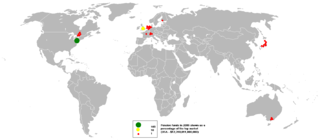
Social security is "any government system that provides monetary assistance to people with an inadequate or no income". In the United States, this is usually called welfare or a social safety net, especially when talking about Canada and European countries.
A pension is a fund into which a sum of money is added during an employee's employment years and from which payments are drawn to support the person's retirement from work in the form of periodic payments. A pension may be a "defined benefit plan", where a fixed sum is paid regularly to a person, or a "defined contribution plan", under which a fixed sum is invested that then becomes available at retirement age. Pensions should not be confused with severance pay; the former is usually paid in regular installments for life after retirement, while the latter is typically paid as a fixed amount after involuntary termination of employment prior to retirement.

A pension fund, also known as a superannuation fund in some countries, is any plan, fund, or scheme which provides retirement income.
In the United States, Social Security is the commonly used term for the federal Old-Age, Survivors, and Disability Insurance (OASDI) program and is administered by the Social Security Administration. The original Social Security Act was signed into law by President Franklin D. Roosevelt in 1935, and the current version of the Act, as amended, encompasses several social welfare and social insurance programs.

The Social Security Act of 1935 is a law enacted by the 74th United States Congress and signed into law by President Franklin D. Roosevelt. The law created the Social Security program as well as insurance against unemployment. The law was part of Roosevelt's New Deal domestic program.
The Federal Old-Age and Survivors Insurance Trust Fund and Federal Disability Insurance Trust Fund are trust funds that provide for payment of Social Security benefits administered by the United States Social Security Administration.
Welfare is a type of government support for the citizens of that society. Welfare may be provided to people of any income level, as with social security, but it is usually intended to ensure that people can meet their basic human needs such as food and shelter. Welfare attempts to provide a minimal level of well-being, usually either a free- or a subsidized-supply of certain goods and social services, such as healthcare, education, and vocational training.

Payroll taxes are taxes imposed on employers or employees, and are usually calculated as a percentage of the salaries that employers pay their staff. Payroll taxes generally fall into two categories: deductions from an employee’s wages, and taxes paid by the employer based on the employee's wages. The first kind are taxes that employers are required to withhold from employees' wages, also known as withholding tax, pay-as-you-earn tax (PAYE), or pay-as-you-go tax (PAYG) and often covering advance payment of income tax, social security contributions, and various insurances. The second kind is a tax that is paid from the employer's own funds and that is directly related to employing a worker. These can consist of fixed charges or be proportionally linked to an employee's pay. The charges paid by the employer usually cover the employer's funding of the social security system, medicare, and other insurance programs. It is sometimes claimed that the economic burden of the payroll tax falls almost entirely on the worker, regardless of whether the tax is remitted by the employer or the employee, as the employers’ share of payroll taxes is passed on to employees in the form of lower wages than would otherwise be paid. Because payroll taxes fall exclusively on wages and not on returns to financial or physical investments, payroll taxes may contribute to underinvestment in human capital such as higher education.
Social insurance is any government-sponsored program with the following four characteristics:
This article concerns proposals to change the Social Security system in the United States. Social Security is a social insurance program officially called "Old-age, Survivors, and Disability Insurance" (OASDI), in reference to its three components. It is primarily funded through a dedicated payroll tax. During 2015, total benefits of $897 billion were paid out versus $920 billion in income, a $23 billion annual surplus. Excluding interest of $93 billion, the program had a cash deficit of $70 billion. Social Security represents approximately 40% of the income of the elderly, with 53% of married couples and 74% of unmarried persons receiving 50% or more of their income from the program. An estimated 169 million people paid into the program and 60 million received benefits in 2015, roughly 2.82 workers per beneficiary. Reform proposals continue to circulate with some urgency, due to a long-term funding challenge faced by the program as the ratio of workers to beneficiaries falls, driven by the aging of the baby-boom generation, expected continuing low birth rate, and increasing life expectancy. Program payouts began exceeding cash program revenues in 2011; this shortfall is expected to continue indefinitely under current law.
Social Security Disability Insurance is a payroll tax-funded federal insurance program of the United States government. It is managed by the Social Security Administration and designed to provide income supplements to people who are physically restricted in their ability to be employed because of a notable disability. SSD can be supplied on either a temporary or permanent basis, usually directly correlated to whether the person's disability is temporary or permanent.

Social security is divided by the French government into four branches: illness; old age/retirement; family; work accident; and occupational disease. From an institutional point of view, French social security is made up of diverse organismes. The system is divided into three main Regimes: the General Regime, the Farm Regime, and the Self-employed Regime. In addition there are numerous special regimes dating from prior to the creation of the state system in the mid-to-late 1940s.
Welfare in France includes all systems whose purpose is to protect people against the financial consequences of social risks.

An executive agency is a part of a government department that is treated as managerially and budgetarily separate, to carry out some part of the executive functions of the United Kingdom government, Scottish Government, Welsh Government or Northern Ireland Executive. Executive agencies are "machinery of government" devices distinct both from non-ministerial government departments and non-departmental public bodies, each of which enjoy a real legal and constitutional separation from ministerial control. The model was also applied in several other countries.
Taxation in Italy is levied by the central and regional governments and is collected by the Italian Agency of Revenue. Total tax revenue in 2018 was 42,4% of GDP. Most important earnings are: income tax, social security, corporate tax and value added tax, All of those are collected at national level, but some of those differs across regions. Personal income taxation in Italy is progressive.
The National Social Security Fund is a supplementary fund of the People's Republic of China which is used for social security. The fund was managed by National Council for Social Security Fund.
Pensions in Pakistan are provisions which are provided to retired employees. Because only the retired formal sector mostly benefits from pensions, most of the social schemes and retirement welfare system in the country cover a small proportion of the old-age population, whereas a significant proportion of the elderly population working in the informal sector remains largely unprotected by these social security schemes. There have been calls for devising and implementing reform in the pension sector of the country in a way where there is efficient deployment of resources and the eligible, yet economically disadvantaged portion of the retired population, is also entitled to receive and be endowed with this social security right.

The Ministry of Social Policy of Ukraine, formerly the Ministry of Labor and Social Policy, is the Ukrainian government department responsible for instituting labor relations, family and children, immigration and trafficking, women's rights, children's rights, and humanitarian aid.

The Ministry of Labour, Migrations and Social Security (MITRAMISS) is the department of the Government of Spain responsible for planning and carrying out the government policy on labour relations, employment and Social Security, as well as the developing the government policy on foreigners, immigration and emigration.









